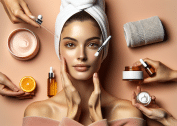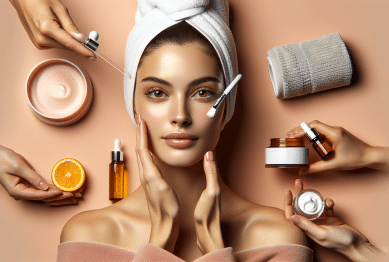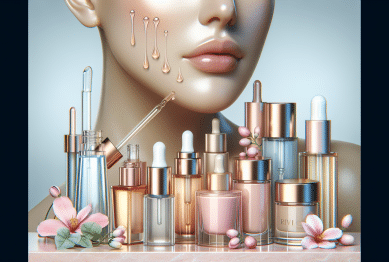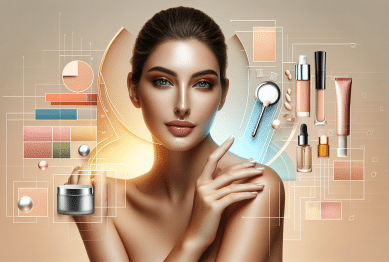Curious about how collagen supports skin, hair, and joint wellness? This guide dives into the science of collagen, its influence on beauty routines, anti-aging tips, and what to consider if you’re hoping to enhance your natural glow with popular wellness strategies.
The Science Behind Collagen and Skin Health
Collagen is a naturally occurring protein that provides structure and strength to your skin, helping maintain elasticity and firmness. As one of the most abundant proteins in the body, it’s essential for the overall integrity of skin, hair, and even nails. Over time, natural collagen production declines, which can be influenced by age, sun exposure, and environmental factors. This gradual loss has prompted many wellness enthusiasts to explore ways to boost collagen levels both through dietary intake and topical applications (Source: https://www.ncbi.nlm.nih.gov/pmc/articles/PMC3583892/).
Scientific studies suggest that collagen peptides, when consumed as part of a balanced diet, may boost skin hydration and improve elasticity. In fact, a number of clinical investigations have tracked improved moisture retention and even reduced wrinkle depth after sustained collagen supplementation. While the exact mechanism remains an ongoing area of study, peptides derived from bovine or marine sources show promising results among adult populations aiming to retain a youthful appearance and healthier skin texture (Source: https://www.sciencedirect.com/science/article/pii/S0022202X15326080).
Sun damage, pollution, and even dietary choices all affect how collagen behaves within the body. Antioxidant-rich foods, like berries and leafy greens, may counteract environmental stressors that degrade collagen. For people who are committed to long-term wellness, regular sunscreen use, hydration, and a nutrient-dense diet can help maximize the natural benefits of collagen and support radiant, resilient skin over the years (Source: https://www.aad.org/public/everyday-care/skin-care-secrets/routine/skin-aging).
How Collagen Supports Hair and Nail Strength
Apart from skin health, collagen supplements have gained popularity for their supposed abilities to strengthen hair and support nail growth. By delivering key amino acids, such as glycine and proline, collagen can serve as foundational support for keratin—the protein essential for shiny, healthy hair. Many individuals notice that with consistent collagen intake, their hair not only thickens but sheds less and displays improved volume and luster (Source: https://www.health.harvard.edu/staying-healthy/collagen-supplements-are-they-beneficial).
Brittle nails can be a sign of insufficient dietary support or underlying wellness concerns. Research indicates that collagen hydrolysate may boost nail growth rates and reduce breakage, contributing to an overall healthier appearance. This comes as welcome news for those who experience cracked or slow-growing nails, and it supports the rising trend of prioritizing holistic beauty from within. Wellness strategies often link this improvement to collagen’s role in supporting connective tissue repair and regeneration (Source: https://www.ncbi.nlm.nih.gov/pmc/articles/PMC6835901/).
Dietary sources of collagen are abundant in bone broth, fish skin, and eggs, while vegan-friendly approaches often focus on boosting the body’s own collagen synthesis with vitamin C and zinc. Some hair and nail serums on the market also contain hydrolyzed collagen for topical support. It’s important to combine these approaches with a healthy lifestyle, including adequate protein and limited exposure to harsh chemicals or treatments that can weaken hair and nails.
Collagen for Joint Wellness and Active Lifestyles
Joint discomfort is a concern for many, particularly with age or repetitive physical activity. Collagen types I and II play key roles in cartilage integrity and shock absorption. Several studies involving athletes and older adults report enhanced mobility and reduced stiffness after regular collagen peptide supplementation. Support for tendons and ligaments may lessen the risk of overuse injuries, making collagen an appealing addition to the routines of both fitness enthusiasts and those simply seeking greater comfort in daily movement (Source: https://ods.od.nih.gov/factsheets/Collagen-Consumer/).
Unlike many quick fixes, the effects of collagen on joints may take several weeks—or even a few months—to become noticeable. The body gradually synthesizes and incorporates these peptides into connective tissues. Therefore, building the habit of regular supplementation, combined with gentle stretching and low-impact exercise, can further support joint resilience. Transparency regarding expectations and time frame is important for anyone considering collagen as part of their wellness journey.
Some professional organizations recommend collagen as one element in a holistic joint health plan. Other supportive strategies include staying physically active, maintaining a stable weight, and ensuring adequate omega-3 fatty acid consumption. These combined efforts promote smoother joint function, potentially easing discomfort associated with arthritis or age-related changes.
Integrating Collagen Into Beauty and Wellness Regimens
Modern wellness routines often blend collagen supplements into daily rituals, from morning smoothies to bedtime tea. The appeal comes not just from looking better, but feeling more energized and at ease with one’s natural appearance. Many products offer powder, capsule, and even liquid varieties—each targeting different preferences with a growing array of flavors and concentrations. Deciphering labels and ingredient lists can give consumers confidence that they are choosing quality from reputable sources.
People may also pair collagen with other evidence-based beauty steps, such as using hyaluronic acid serums, practicing facial massage, and investing in high-SPF sunscreens. These habits work in unison to preserve the results of collagen supplementation, creating a multi-layered approach to anti-aging and glow. As with any trending product, it’s wise to remain discerning—prioritizing peer-reviewed findings and the guidance of qualified skin health professionals when choosing what’s right for a personal routine.
Some wellness programs encourage documenting changes in skin or hair over several months to better judge efficacy. Keeping a log, taking photos, and being mindful of other lifestyle adjustments can clarify what works and what should be refined. Ultimately, lasting beauty is a unique blend of self-care, science, and patience. It’s not just about miracle solutions, but consistent stewardship of personal well-being.
Safety, Side Effects, and Choosing Collagen Wisely
Like any supplement, collagen carries considerations around safety, allergies, and individual suitability. Reputable sources indicate that most healthy adults experience few side effects, but people with allergies to fish, shellfish, or eggs should read labels carefully. Mild digestive discomfort can occasionally occur, emphasizing the importance of introducing new products slowly and in consultation with healthcare providers (Source: https://www.fda.gov/consumers/consumer-updates/what-you-should-know-about-dietary-supplements).
The wellness marketplace is saturated with choices, and product quality can vary. Looking for third-party verification or medical endorsements often helps in identifying trustworthy brands. Additionally, understanding the differences between collagen types (such as I, II, III) and sources (bovine, marine, porcine) can help tailor selections to personal goals, whether that’s joint comfort, skin texture, or hair thickness. Misleading claims should always be treated with skepticism, and relying on clear, science-backed information is wise.
Lastly, those living with chronic illnesses or on prescription medicines should always consult their doctors before making dietary changes. Some supplements may interact with medications or have unintended consequences. Responsible, informed choices are a cornerstone of true self-care, ensuring wellness and beauty enhancements remain safe and supportive for everyone (Source: https://www.nccih.nih.gov/health/dietary-supplements-what-you-need-to-know).
Long-Term Benefits and Evolving Perspectives on Collagen
Long-term studies are gradually revealing nuanced perspectives about collagen’s efficacy across beauty and wellness goals. Some users may experience noticeable improvements within a few months, such as firmer skin or stronger nails, while others might see subtler shifts. The diversity of experiences is due in part to genetics, lifestyle, and external factors; thus, results can vary widely. Committing to a regimen for at least three to six months often yields the best chance of visible change, as patience is as valuable as the supplement itself.
Trends within beauty and wellness continue to evolve, with new research on the horizon for vegan collagen alternatives and bioengineered proteins. These innovations strive to meet the needs of those with dietary restrictions while providing benefits that natural collagen supports. As understanding improves, wellness communities are increasingly advocating for holistic lifestyle adjustments in tandem with targeted supplementation, emphasizing balanced nutrition, movement, and consistent self-care as the foundation of lasting beauty.
Ultimately, collagen is most effective when viewed as one piece of a multifaceted approach to wellness. It works best in partnership with sound lifestyle habits, positive daily routines, and a clear-eyed view of what the science presently shows. The journey toward healthier skin, hair, and joints is ongoing, adaptable, and personal. Continual learning and self-reflection are key, allowing for flexible choices that support both well-being and individual beauty goals.
References
1. Proksch, E., Schunck, M., Zague, V., Segger, D., Degwert, J., & Oesser, S. (2014). Oral intake of specific bioactive collagen peptides reduces skin wrinkles and increases dermal matrix synthesis. Retrieved from https://www.ncbi.nlm.nih.gov/pmc/articles/PMC3583892/
2. Bolke, L., Schlippe, G., Gerß, J., & Voss, W. (2019). Oral supplementation of specific collagen peptides has beneficial effects on human skin physiology: a double-blind, placebo-controlled study. Retrieved from https://www.sciencedirect.com/science/article/pii/S0022202X15326080
3. American Academy of Dermatology. (2021). Skin aging: Causes, signs, and prevention. Retrieved from https://www.aad.org/public/everyday-care/skin-care-secrets/routine/skin-aging
4. Harvard Health Publishing. (2021). Collagen supplements: Are they beneficial? Retrieved from https://www.health.harvard.edu/staying-healthy/collagen-supplements-are-they-beneficial
5. Office of Dietary Supplements, National Institutes of Health. (2022). Collagen Fact Sheet for Consumers. Retrieved from https://ods.od.nih.gov/factsheets/Collagen-Consumer/
6. National Center for Complementary and Integrative Health. (2023). Dietary Supplements: What You Need to Know. Retrieved from https://www.nccih.nih.gov/health/dietary-supplements-what-you-need-to-know









